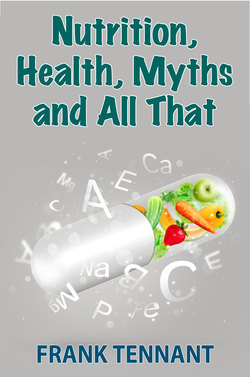Читать книгу Nutrition, Health, Myths and All That - Frank Tennant - Страница 4
EVOLUTION AND FOOD
ОглавлениеIt can take many thousand years of evolution for our biochemistry to manage some foods we are currently encouraged to eat. Hopefully we may wake up to this fact and stop eating them or, possibly, by a process of selection many may cease being able to breed and those that are left could be the progenitors of a new species of homo sapiens!
To give us an indication of beneficial foods it is important to understand what we ate as we evolved.
Opinions differ as to when the present version of homo sapiens, our ancestors, emerged. It seems to have been somewhere between 125,000 and 700,000 years ago.
Our closest living ‘relative’, the chimpanzee, diverted from our mutual family tree some 5 million years ago. But there are only 1.6% of genes that separate us from them - a very small genetic distance.The main changes have been morphological - to the surface! Our biochemistry remains the same. Maybe they can give us some clues as to what is a healthy diet.
There are those who propose that we should not eat meat as our ancestors were basically vegetarian. Yet, some 5 million years ago we had a cousin (australopithelus robustus ), descended from ramapithecus, our common ancestor. Robustus was vegetarian but that line died out.
There is much evidence to show that our forbearers (australopithelus africanus) ate plenty of fish and fowls and that, 2 million years ago, they used stone tools to cut up meat.
Meat has a more concentrated supply of protein than plants. Eating meat, therefore, cuts down the bulk and the time spent in eating by two thirds. The author of ‘The Ascent of Man’ Dr Jan Bronowski, rates this extra time as the spur that enabled our forbearers to move from the biological evolution of man to the next 2 million years of cultural evolution - the making of tools and various art forms which led us,12,000 years ago, into the Agricultural Revolution.
Our Stone Age ancestors ate three times the amount of protein that we do; half the fat; six times the fibre; two to three times the calcium; and no sugar - apart from the occasional honey.
Over many millennia, mankind learnt through trial, error and instinct which foods were beneficial. Animals still have this instinct yet homo sapiens seems to have lost it. As I walk across the paddocks with my dog I notice that at certain times of the year she will eat certain grasses. Livestock will often eat what we may term weeds - they seem to know that they need what that particular plant has to offer.
There is evidence that 14,000 years ago, people living on the islands we now refer to as Japan, were experimenting with cooking food and learning which combinations worked best. They used fire and clay pots.
In recent years the microwave has been a boon to our fast lifestyles...or has it? Has it been in use long enough for us to know? More on that later.
It seems that our nutritional problems started with the Agricultural Age.
